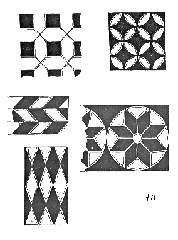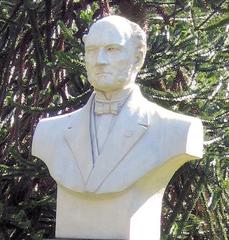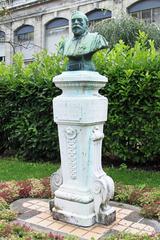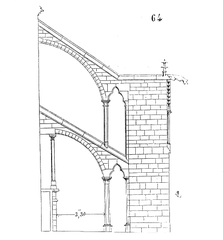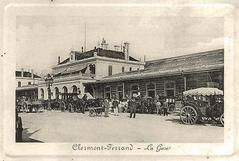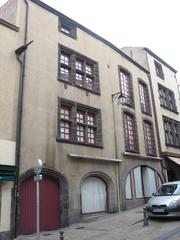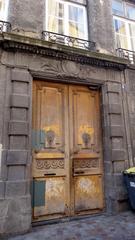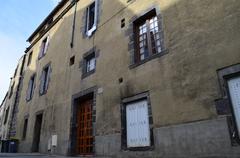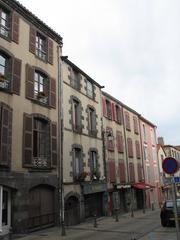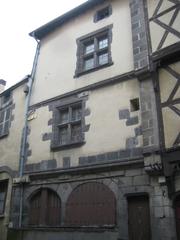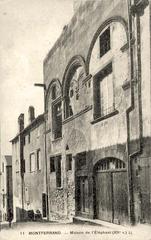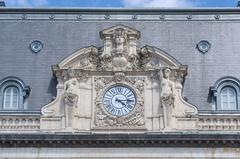Sanctuaire de Trémonteix: Visiting Hours, Tickets, and Complete Guide to Clermont-Ferrand’s Historical Sanctuary
Date: 04/07/2025
Introduction: A Gateway to Gallo-Roman Heritage
Just outside the lively center of Clermont-Ferrand, in the heart of Auvergne, the Sanctuaire de Trémonteix stands as a unique window into the spiritual, social, and architectural world of the Gallo-Romans. Dating from the 3rd century AD and set amid the innovative ÉcoQuartier de Trémonteix, this archaeological site exemplifies both ancient Romanization and modern urban sustainability, making it a must-see for history lovers, architecture enthusiasts, and eco-conscious travelers alike.
The sanctuary’s remarkable finds—including polychrome frescoes, a rare spring-fed water basin, and twin temples—offer visitors a vivid connection to ancient rituals and daily life. The site’s thoughtful integration with surrounding green spaces and sustainable infrastructure reflects Clermont-Ferrand’s ongoing commitment to heritage and innovation. Coupled with excellent visitor amenities, nearby attractions, and accessible pathways, the Sanctuaire de Trémonteix is a highlight of any cultural itinerary in the region.
Official information, updates, and event news can be found on resources such as the Clermont-Ferrand Tourism website, Clermont Métropole, and Aroundus.
Table of Contents
- Historical Overview
- Planning Your Visit
- Nearby Attractions
- Preservation and Heritage Status
- Frequently Asked Questions (FAQ)
- Summary and Recommendations
- Sources and Official Links
Historical Overview
Gallo-Roman Origins and Context
Constructed in the 3rd century AD near the ancient city of Augustonemetum (now Clermont-Ferrand), the Sanctuaire de Trémonteix reflects the deep Romanization of the Auvergne region. Situated on the plateau des Côtes de Clermont at 460 meters altitude, the sanctuary occupied a strategic position overlooking volcanic landscapes and stood close to a Roman villa, serving both religious and social purposes for the local elite (Aroundus).
Archaeological Discoveries
Extensive excavations by INRAP from 2010 to 2011 revealed a complex sacred precinct featuring two main temples (fanum), a monumental entrance porch, and a rare water basin fed by a subterranean spring. The site’s preservation is exceptional, with some walls standing over two meters high. Major finds include:
- Polychrome frescoes with pastoral and animal motifs, offering insight into ancient aesthetics and symbolism.
- Graffiti and ritual objects that reveal details of local beliefs and spiritual life.
- Hydraulic installations such as basins and channels linked to water rituals.
Architectural Features
The sanctuary’s double temple layout, each with a single cella, exemplifies Gallo-Roman religious architecture. The temenos was enclosed by a wall and accessed via a monumental porch, while the broader villa complex included residential, agricultural, and artisanal zones—testimony to the wealth and influence of its owners (Wikipedia, Monumentum).
The sanctuary’s integration into the modern ÉcoQuartier de Trémonteix ensures the preservation of its green and historical context. The use of local volcanic stone and wood, sustainable landscaping, and eco-friendly infrastructure reflects a blend of ancient and contemporary values (Clermont Métropole).
Planning Your Visit
Opening Hours and Admission
- Seasonal Access: Open from April to October, Tuesday to Sunday, 10:00 AM to 6:00 PM. Closed Mondays and certain public holidays. Hours may vary for special events.
- Off-Season: The site is generally accessible year-round as an open-air monument. Check for seasonal restrictions or closures during winter.
Tickets and Guided Tours
- General Admission: Entry is often free for self-guided visits, especially outside of special events. During designated periods or festivals, ticketed access may apply (typically €5–€6 for adults, reduced rates for seniors, students, and free for children under 12).
- Guided Tours: Available on weekends, public holidays, and by appointment. These tours provide expert commentary on the site’s history, archaeology, and architecture.
- Booking: Purchase tickets online via the Clermont-Ferrand tourism website or at the entrance during staffed hours.
Accessibility
- Mobility: The sanctuary features accessible pathways and ramps. Some terrain is uneven, so visitors with limited mobility may wish to bring assistance or contact the site in advance.
- Facilities: While the sanctuary itself does not have on-site amenities, its urban location ensures nearby access to restrooms, cafés, and shops.
Getting There
- Public Transport: Regular bus routes connect the ÉcoQuartier de Trémonteix to the city center. Pedestrian and bike paths are available for sustainable access.
- By Car: Limited parking is available. Visitors are encouraged to use public transport to support the eco-district’s sustainability goals.
- Address: 4 Rue Victor Charreton, 63100 Clermont-Ferrand (Monumentum).
Tips and Visitor Services
- Best Time to Visit: Spring and summer for lush landscapes, guided tours, and events.
- Photography: Permitted throughout the site. Early morning and late afternoon provide optimal lighting.
- Weather: Clermont-Ferrand has a temperate climate—bring appropriate clothing for outdoor exploration.
- Safety: The site is safe; standard precautions apply.
- Payments: Euro currency; cards widely accepted in the city.
Nearby Attractions
Enhance your cultural itinerary with these sites:
- Clermont Cathedral: Gothic architecture in local volcanic stone.
- Temple of Mercury on Puy de Dôme: Another major Gallo-Roman sanctuary.
- Roman baths at Royat: Well-preserved Roman thermal complex.
- Musée d’Art Roger Quilliot: Regional art and history.
- Parc de Montjuzet: Urban green space with city views (Mapcarta).
Preservation and Heritage Status
The Sanctuaire de Trémonteix is a protected historic monument since 2012, preserved as a green zone within the urban landscape. Strict regulations govern construction and landscaping in the area, ensuring the sanctuary’s integrity for future generations (POP Culture Gouv).
Frequently Asked Questions (FAQ)
What are the regular opening hours?
April–October, Tuesday–Sunday, 10:00 AM–6:00 PM. Check official sources for seasonal changes.
Is there an entrance fee?
Generally free for self-guided visits; ticketed during special events or guided tours.
How accessible is the site?
Accessible paths and ramps are present, but some uneven terrain may require assistance.
Are guided tours available?
Yes, on weekends, public holidays, and by appointment.
Can I take photos?
Photography is permitted throughout the site.
How do I get there by public transport?
Regular city buses connect the site to the center of Clermont-Ferrand.
Summary and Recommendations
The Sanctuaire de Trémonteix offers a compelling journey through Gallo-Roman history, set within Clermont-Ferrand’s forward-looking eco-district. With its unique architectural features, exceptional preservation, and sustainable integration, the sanctuary stands as a testament to the region’s rich past and modern innovation. Plan your visit during open seasons or special heritage days, take advantage of guided tours for deeper insight, and explore nearby attractions to enrich your cultural experience. For the latest updates, guided tour schedules, and recommendations, consult the official tourism portals and consider using digital tools like the Audiala app.
Sources and Official Links
- Aroundus – Sanctuaire de Trémonteix
- Clermont Métropole – ÉcoQuartier de Trémonteix
- Clermont-Ferrand Tourism – Sanctuaire de Trémonteix
- Wikipedia – Trémonteix Sanctuary
- Monumentum – Sanctuaire de Trémonteix
- POP Culture Gouv – Sanctuaire de Trémonteix
- Mapcarta – Parc de Montjuzet
For detailed visitor information, real-time updates, and digital guided tours, download the Audiala app and follow official social media channels for Clermont-Ferrand’s cultural heritage.
